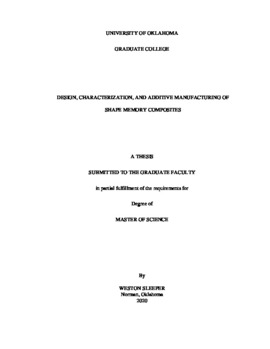| dc.description.abstract | Direct Ink Writing (DIW) is an additive manufacturing method that utilizes a reservoir of fluid that is precisely extruded to construct 3-Dimensional (3D) structures from layering 2-Dimensional (2D) patterns. Fluids used in DIW printing can vary from in-situ, UV-cured resins to thermosetting epoxies that are solidified following the printing process. This thesis explores the latter fluid, specifically those epoxies which possess shape memory abilities. The shape memory function allows a solid, printed component to deform elastically when its temperature exceeds the glass transition temperature (T_g). However, shape memory epoxies traditionally lack the necessary fluid qualities for printing. By forming a composite ink and integrating a network of multiwalled carbon nanotubes (MWCNTs) or carbon black within the uncured fluid profile, the resulting multiphase ink can possess the requisite fluid rheology to facilitate 3D printing through the DIW process. This thesis examines the development and characteristics of two novel DIW inks, one supported by carbon black and the other supported by MWCNTs. In both cases, the composite ink, made printable by either its carbon black or MWCNT content, is further reinforced with VMX24 carbon short fibers. The varying short fiber content revealed various trends in conductivity and mechanical characteristics of the finished 3D printed samples. For the carbon-black based ink, the resulting prints proved themselves to be potential candidates for strain sensors, given their strong electromechanical response at low strain. For both MWCNT- and carbon black-based epoxy inks, the shape memory effect of the base epoxy was retained, resulting in novel DIW inks that are both functional and mechanically resilient. | en_US |
